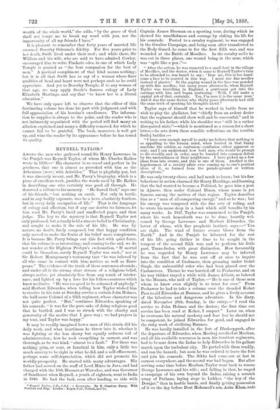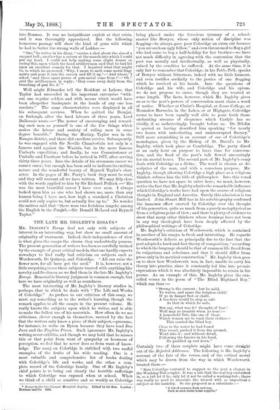REYNELL TAYLOR.* AMONG the men who gathered round Sir Henry
Lawrence in the Punjab was Reynell Taylor, of whom Mr. Charles Raikes wrote in 1858,—" His character is so round and perfect in its goodness, that one is almost as provoked with him as the Athenians [were] with Aristides." That is playfully put, but it was sincerely meant, and Mr. Parry's biography, which is a piece of excellent work, justifies the words used by Mr. Raikes in describing one who certainly was good all through. He deserved a tribute to his memory. " He feared God," says one of his friends, " but nothing on earth. Not only in battle, and in any bodily exposure, was he a hero, absolutely fearless, but in every daily occupation of life." That is the language of eulogy and affection, but if any one doubts its fairness, let him read Mr. Parry's lucid and unaffected pages, and then judge. The key to the mystery is that Reynell Taylor not only professed, but actually held a sincere belief in Christianity, and sought to make it the rule of his life. He was by nature, no doubt, finely composed, but that happy condition only served to make the fruits of his belief more conspicuous. It is because Mr. Parry brings out this fact with quiet force, that his volume is so interesting ; and coming to the end, we do not wonder at Sir Dighton Probyn's exclamation, " If mortal could be blameless, surely Reynell Taylor was such ;" nor at Sir Robert Montgomery's testimony that "he was beloved by all who came in contact with him, natives as well as Euro- peans." The evidence of the truth of these sentences abounds ; and under all is the strong clear stream of a religious belief, always active, yet absolutely free from any touch of intoler- ance, and lighted up by a love for his fellow-creatures which knew no limits. " He was too good to be ashamed of anybody," said Herbert Edwardes, when telling how Taylor wished him to receive in his tent at Sunday service a certain John Holmes, the half-caste Colonel of a Sikh regiment, whose character was not quite perfect. " But," continues Edwardes, speaking of his comrade, " it was for the pure sake of doing religious good that he battled, and I was so struck with the charity and generosity of the motive that I gave way ; we had prayers in my tent, and Taylor was happy."
It may be readily imagined how a man of this strain did his daily work, and what heartiness he threw into it, whether it was fighting or the less showy but equally arduous toil of administration; how he took everything in earnest, and was thorough, as he was kind, " almost to a fault." For there was nothing grim, or sour, or fanatical in him, only a little too much anxiety to be right in what he did, and a self-effacement, perhaps some self-depreciation, which did not promote his worldly prosperity. He started with many advantages. His father had served on the staff of Lord Minto in Java, and had charged with the 10th Hussars at Waterloo, and was Governor of Sandhurst when Reynell, a youth of eighteen, went to India in 1840. He had the luck, soon after landing, to ride with
Begnell Taylor, C.B. a Biography. By B. Gamb:er Parry. With Portrait and Map, London Kegan Paul, Trench, and Co.
Captain James Sleeman on a sporting tour, during which he showed his unselfishness and courage by risking his life for his comrade. Posted to a cavalry regiment, he was engaged in the Gwalior Campaign, and being soon after transferred to the. Body Guard, he came in for the first Sikh war, and was wounded at the Battle of Moodkee. In the cavalry mage he was cut in three places, one wound being in the nose, which was " split like a pea :"— " After the action, he was removed to a small tent in the village of Moodkee, and the doctor, when it came to Reynell Taylor's turn to be attended to, was heard to say : ' Dear me, this is too hand- some a face to be scarred in this way. I must use fine needles instead of plaster.' So the gaping wound in the face was mended up with fine needles; but many years afterwards, when Reynell Taylor was travelling in England, a gentleman got into the carriage with him and began muttering : Well, I did make a capital job of that, certainly. Yes, I'm sure it is the same nose.' And it was the same doctor, who thirty years afterwards had still the same trick of speaking his thoughts aloud."
Taylor says of himself that he worked in battle from no wish to play the gladiator, but "chiefly from an ardent desire that the regiment should show well and be successful," and in writing to his father, while his shoulder was " still in a rather disrepaired state,"—which is mentioned as a reason for a short letter,—he sets down these sensible reflections on the terrible Sutlej battles :— " I have seen enough myself to make me believe that nothing is so appalling to the human mind, when located in that funny machine the soldier, as confusion—confusion either apparent or real ; and I can understand how bold men, who would be prompt to die steadily and in order, may be hurried into common defeat by the unsteadiness of their neighbours. I have picked up a few ideas from late events, and this is one of them. Another is the hopelessness of a cavalry affair ever coming up to one's poetical ideas of it, as formed from the parade-ground or written descriptions."
He was only twenty-three, and had much to learn ; but his fine behaviour in action charmed Sir Henry Hardinge, and learning that the lad wanted to become a Political, he gave him a post in Ajmere, then under Colonel Dixon, whose name is yet famous among the natives of that region. Taylor describes him as a " man of all-conquering energy," and so he was ; but his energy was tempered with the fine arts of ruling, and he wrote his name deep in a land which still benefits by his many works. In 1847, Taylor was summoned to the Punjab, where his work henceforth was to be done, heartily wel- comed by George Lawrence and Herbert Edwardes, the latter of whom, with fine prophetic instinct, says :—" You are right. The wind of future events blows from the North." And in the Punjab he laboured for the rest of his life, going thither in time to be caught in the tempest of the second Sikh war, and to perform his little part, Trans-Indus, with great distinction. How favourably he was regarded by Henry Lawrence may be inferred from the fact that he was sent off at once to inquire into the condition of Cashmere, then groaning under Golab Singh, the unbeautiful ruler who had been placed over the Cashmerees. Thence he was hurried off to Peshawar, and on his way thither stayed a while with James Abbott, so beloved in the Huzara, who said of Taylor,—" He is one of those men whom to know even slightly is to trust for ever." From Peshawar he had to take a column over the dreaded Kohat Pass to aid Edwardes at Bunnoo, and he gives a lively account of the laborious and dangerous adventure. In his diary, dated November 28th, Sunday, is the entry,—" I read the service to John Holmes and the doctor ; the first time our service has been read at Kohat, I suspect." Later on, when he overcame his natural modesty and fear lest he should not be competent, he joined Edwardes for good, and engaged in the risky work of civilising Bunnoo.
He was hardly installed in the fort of Dhuleepgurh, after the departure of Edwardes, when lifoolraj revolted at Mooltan, and all his available resources in men, his trustiest regiments, had to be sent down the Indus to help Edwardes in his gallant march upon the turbulent city. He parted with them readily, and ran the hazard ; but soon he was ordered to leave the fort and join his comrade. The Sikhs had come out at last in earnest everywhere, and the second war had begun. But after serving some time before Mooltan, Taylor went back to rescue George Lawrence and his wife ; and failing in that, he waged a campaign of his own beyond the Indus, raising a scratch army of Pathans, laying siege to Lukkee, " the key of the Derajat," then in hostile hands, and finally getting possession of it on the day before Dost Mohamed's son, Azim Khan, rode into Bunnoo. It was no insignificant exploit at that crisis, and it was thoroughly appreciated. But the following humorous passage will show the kind of guns with which he had to batter the strong walls of Lukkee :- "One," he writes in his diary, " carries a shot about the size of a racquet ball ; another has a cavern at the muzzle into which I could put my head. I could not help making some slight demur on seeing this, upon which the head artilleryman said that he had hit upon an excellent remedy for that. I inquired what that might be, to which he answered, Why, I mean to melt some metal frag- ments and pour it into the cavern and fill it up.'—' And where,' I asked, ' may those spare pieces of gun-metal come from Oh !' said the artilleryman in reply; 'they come away daily from the breeching of gun No. 3' " Well might Edwardes tell the Resident at Lahore, that Taylor had succeeded in his important enterprise "with- out one regular soldier, and with means which would have been altogether inadequate in the hands of any one less resolute." The same characteristics were displayed in all his subsequent services. When he quitted the Derajat, on furlough, after the hard labours of three years, Lord Dalhousie wrote :—" The power of encouraging and reward- ing such men as yourself is one of the few things which makes the labour and anxiety of ruling men in some degree bearable." During the Mutiny, Taylor was in the Kangra district, and there did excellent service. Subsequently, he was engaged with Sir Neville Chamberlain not only in a famous raid against the Waziris, but in the more famous Umbeyla expedition; and finally, he was Commissioner at Umballa and Umritsur before he retired in 1877, after serving thirty-three years. Into the details of his strenuous career we cannot enter; but enough has been said to indicate its exciting nature and the wonderful beauty of Reynell Taylor's char- acter. In the pages of Mr. Parry's book they must be read, and they will warrant all we have written. We may fitly close with the words applied to him by Sir Richard Pollock :—" His was the most beautiful career I have ever seen. I always looked upon him as one who had shown me, more than any human being I have met, how high a standard a Christian could not only aspire to, but actually live up to." No wonder the natives said that "there were two ferishtas (angels) among the English in the Punjab,—Sir Donald McLeod and Reynell Taylor."



































 Previous page
Previous page